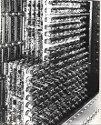As I presumed before, to be a person conscious of self-hood, you need at least two components, real-time event processing and long-term memory; if you don't have these, you won't be 'you'. Therefore, we can look at what might sustain these after our organic processes cease. First, we have a severe data storage problem. Our mind is not a video recorder which keeps track of every moment of our lives – there is simply not enough storage for that. Cleverly, our brain seems to compress our experiences, just like jpeg compression makes photographic images smaller, but does it much more effectively. However, this is a 'lossy' compression, where most details are thrown out and replaced with template objects. This is one reason why memories are notoriously unreliable; a few missing or altered 'bits' don't just smudge the image; they can completely replace it with another template – but again, this may be a subject for a later time. So, we need storage - even highly compressed, a lot of it.
It is unknowable whether there is another dimension which auto-magically keeps track of our own personal neuronal map, but it is clear that as the physical brain disintegrates, so do 'we'. It is possible to argue that the physical map of our brain is only a contemporary manifestation of a greater reality, and that when Granny dies, her Alzheimers, which blocks the reality coming through, will vanish and she will be whole again. Somehow I doubt this, but it is a necessary condition for a personality to survive death – or at least for now...
 Ray Kutzweil writes of
the 'Singularity', where computational systems can fulfill the function of this
presumed etherial storage system and preserve at least the memory aspects of the personality. I'm sure some
details have yet to be worked out, but at least positing this does not violate any known laws of physics.
However, few of us would think having the immortality of a library book would be all that great. Where would the
necessary real-time interaction come from? Personally, I would miss the nose of a fine Bordeaux or the savor of a
perfectly grilled steak, not to mention other fun things. I suppose with a lot more work these might be
electronically simulated, but then who is in charge of the simulation? The thought of some bored teen-age hacker
pulling out my digital fingernails does not thrill me... With enough computational complexity, one could possibly end
up with something like the Matrix, but I
have doubts that a simulation of reality would be anything like reality, and why would a society want to waste
all those resources anyway?
Ray Kutzweil writes of
the 'Singularity', where computational systems can fulfill the function of this
presumed etherial storage system and preserve at least the memory aspects of the personality. I'm sure some
details have yet to be worked out, but at least positing this does not violate any known laws of physics.
However, few of us would think having the immortality of a library book would be all that great. Where would the
necessary real-time interaction come from? Personally, I would miss the nose of a fine Bordeaux or the savor of a
perfectly grilled steak, not to mention other fun things. I suppose with a lot more work these might be
electronically simulated, but then who is in charge of the simulation? The thought of some bored teen-age hacker
pulling out my digital fingernails does not thrill me... With enough computational complexity, one could possibly end
up with something like the Matrix, but I
have doubts that a simulation of reality would be anything like reality, and why would a society want to waste
all those resources anyway?
 So, I
don't see any realistic way to preserve the essential elements of one's personality, but if something
less was possible, would it suffice? Helen Lane
(Henrietta Lacks) is immortal – or at least her cells are; she (her HeLa cancer cells) are found all over the
world and have been used in cell research for decades after her death. This is clearly a case of physical
(genetic) immortality, but the person herself is long gone. Without preserving the complexity of our lives, is
there a meaningful life after death? There may be some type of 'survival' – but it won't be
'yours'.
So, I
don't see any realistic way to preserve the essential elements of one's personality, but if something
less was possible, would it suffice? Helen Lane
(Henrietta Lacks) is immortal – or at least her cells are; she (her HeLa cancer cells) are found all over the
world and have been used in cell research for decades after her death. This is clearly a case of physical
(genetic) immortality, but the person herself is long gone. Without preserving the complexity of our lives, is
there a meaningful life after death? There may be some type of 'survival' – but it won't be
'yours'.

